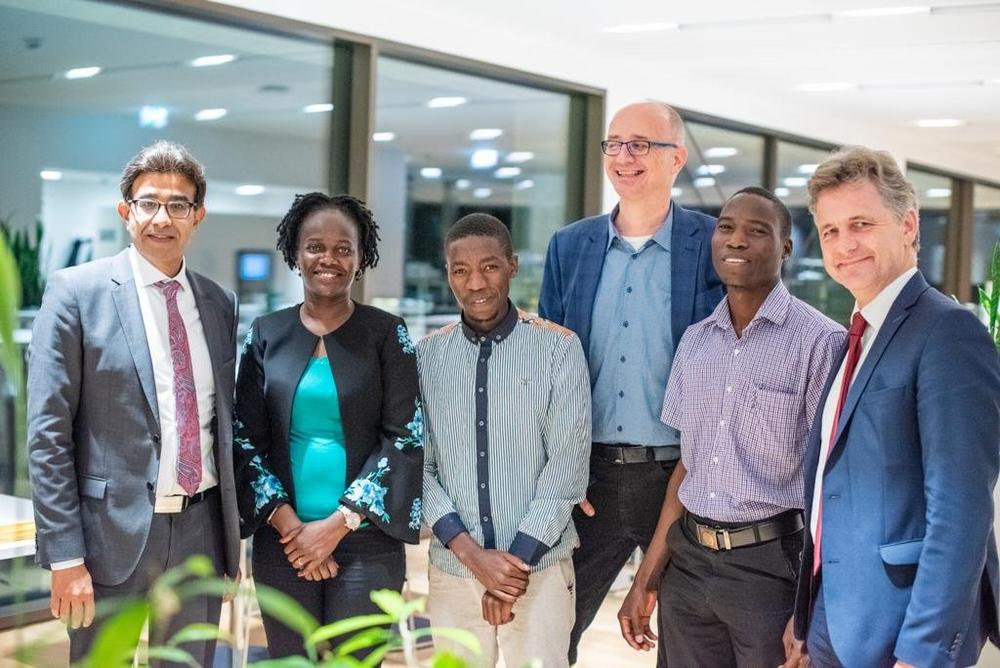Currently, there is a considerable need for renewable energy technologies in Uganda. Uganda’s electrification rate is 28%. In 2018, it was estimated that 6.5 million households had no electricity connection.
Renewable energy sources have dominated the expansion of energy supply in Uganda since 2013. Of the 1,206 MW currently fed into the grid, 79% comes from large hydro, 10% from small hydro, 5% from Bagasse Co-generation, 4% from thermal, 1% from solar and 1% from imports. In addition, around 270,000 solar PV home systems were sold in Uganda by 2018. These do not form part of the grid, but rather cover individual energy consumption.
Network expansion and the development of decentralized energy solutions are urgently needed in Uganda to meet electrification needs. The integration of electricity from intermittent renewable energy sources requires the use of energy storage and a smart grid approach.
Uganda currently lacks a suitable research infrastructure for the development of new technologies. The aim of the German-funded project "RenEn Uganda” – involving the Fraunhofer Institute for Chemical Technology ICT, Karlsruhe University of Applied Sciences and Makerere University in Uganda’s capital Kampala – is to establish this research infrastructure. Makerere University is considered the best African university outside of South Africa.
The expected outcomes of “RenEn Uganda” is that Makerere University becomes a center of excellence for applied and contract research in Uganda and the region, developed around a sustainable business model.
"Due to the extensive electricity network in Europe, some technologies, such as large-scale energy storage systems, are not economically viable," says project coordinator Dr. Stefan Tröster from Fraunhofer ICT. "However, in Africa, depending on the region, the lack of electricity networks leads to higher energy generation costs – 2-3 times higher than in Europe. Systems must therefore be designed differently, enabling an economically competitive use of micro-grids based on renewable energies, with integrated energy storage.“ For these applications, there is a significant economic potential for technologies developed in Germany and Europe, and also, in particular, a great opportunity for Uganda to develop its own technologies and to establish a research infrastructure connecting universities and industrial companies.
This is the aim of the German-funded project “RenEn Uganda”. The two-year project will foster cooperation between industry and research, facilitate the associated innovation process and develop the necessary structures for joint research projects between Makerere University and industrial partners. The scientific-technological basis for this capacity development will be the simulation, modeling and design of micro-grids based on real scenarios in Uganda, the integration of renewable energy sources, especially from water, sun and wind, and the use of energy storage systems.
“We are very much looking forward to working together with the partners from Karlsruhe," says the lead scientist Dr. Roseline Akol from Makerere University. “This is a flagship project at the university, as well as for the government ministries concerned". The partners aim to form a long-term cooperation that will enable them to carry out economically successful application projects. In particular, local companies in Uganda will be strengthened or start-ups developed which can work together with Makerere University and German research and industrial partners in these projects.
“RenEn Uganda” is one of the outcome of the visit of the Honourable Minister of Finance, Planning and Economic Development, Mr. Matia Kasaija who visited Karlsruhe in July 2018 on behalf of the President of Uganda on the invitation of Mr. Arshad Rab, CEO, European Organisation for Sustainable Development (EOSD). The project is being carried out with the full support of EOSD and Uganda Development Bank Ltd (UDBL) led by its Managing Director Mrs. Patricia Ojangole. Since the project has the element of startups and business to business relationships between Uganda and Germany, the Start Up Alliance in Karlsruhe will participate and contribute to its success.
The Fraunhofer-Gesellschaft, headquartered in Germany, is the world’s leading applied research organization. With its focus on developing key technologies that are vital for the future and enabling the commercial exploitation of this work by business and industry, Fraunhofer plays a central role in the innovation process. As a pioneer and catalyst for groundbreaking developments and scientific excellence, Fraunhofer helps shape society now and in the future. Founded in 1949, the Fraunhofer-Gesellschaft currently operates 74 institutes and research institutions throughout Germany. The majority of the organization’s 28,000 employees are qualified scientists and engineers, who work with an annual research budget of 2.8 billion euros. Of this sum, 2.3 billion euros is generated through contract research.
The Fraunhofer-Gesellschaft, headquartered in Germany, is the world’s leading applied research organization. With its focus on developing key technologies that are vital for the future and enabling the commercial exploitation of this work by business and industry, Fraunhofer plays a central role in the innovation process. As a pioneer and catalyst for groundbreaking developments and scientific excellence, Fraunhofer helps shape society now and in the future. Founded in 1949, the Fraunhofer-Gesellschaft currently operates 74 institutes and research institutions throughout Germany. The majority of the organization’s 28,000 employees are qualified scientists and engineers, who work with an annual research budget of 2.8 billion euros. Of this sum, 2.3 billion euros is generated through contract research.
Fraunhofer-Institut für Chemische Technologie ICT
Joseph-von-Fraunhofer-Straße 7
76327 Pfinztal
Telefon: +49 (721) 4640-0
Telefax: +49 (721) 4640-111
http://www.ict.fraunhofer.de
Zentrales Management
Telefon: +49 (721) 4640-392
Fax: +49 (721) 4640-111
E-Mail: stefan.troester@ict.fraunhofer.de
![]()

